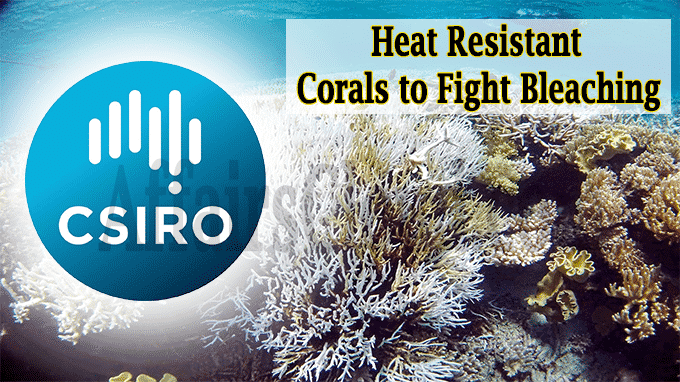 A team of scientists of CSIRO (Commonwealth Scientific and Industrial Research Organisation )and Australia’s national science agency, the Australian Institute of Marine Science (AIMS) and the University of Melbourne successfully discovered corals with increased heat tolerance which has potential to reduce the impacts of coral reef bleaching due to climatic change.
A team of scientists of CSIRO (Commonwealth Scientific and Industrial Research Organisation )and Australia’s national science agency, the Australian Institute of Marine Science (AIMS) and the University of Melbourne successfully discovered corals with increased heat tolerance which has potential to reduce the impacts of coral reef bleaching due to climatic change.
Key Points:
i.The climatic changes have resulted in decreasing coral cover and under increasing pressure as water temperature rises and the frequency and severity of coral bleaching events on the surviving corals.
ii.Bolstering the heat tolerance of its microalgal symbionts, the tiny cells of algae that live inside the coral tissues, the team made the coral more tolerant to the temperature induced leaching.
iii.This approach will strengthen the heat resistance of the coral reef by manipulating the microalgae, the key factor of the coral’s heat tolerance.
iv.Using the “direct evolution” technique the team isolates the microalgae from the coral and culture them in a specialist symbiont lab at the AIMS and expose them to the increasingly warmer temperature for a period of 4 years which will help them to adapt and survive in the hotter condition.
v.Microalgae are reintroduced into the coral larvae, the symbiosis of the newly established coral-algae are more tolerant to the heat compared to the original.
vi.The exposed temperatures are similar to the temperature of the ocean during the current simmer marine heat waves which causes coral bleaching on the Great Barrier Reef.
vii.The findings of this research are
- The microalgae and the coral are in direct communication
- Some mechanisms responsible for the enhanced coral bleaching tolerance
- The heat tolerant microalgae are better at photosynthesis and improve the heat response of the coral animal.
viii.The research was funded by the CSIRO, Paul G. Allen Family Foundation (USA), AIMS and the University of Melbourne.
ix.The algal strain in adult colonies across a range of coral species is the next stage of the research.
About CSIRO:
Chairman- David Thodey AO
Deputy Chairperson- Shirley In’t Veld
Chief Executive- Larry Marshall
Founded- 1916
Headquarters- Australia




